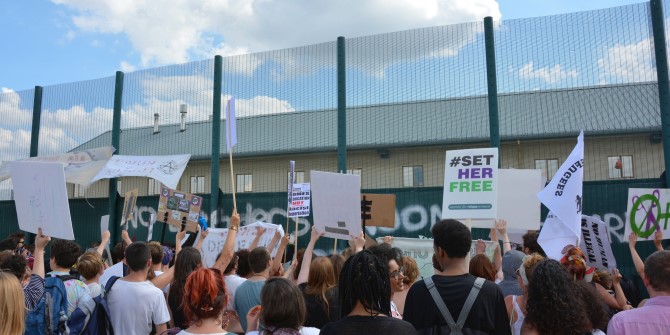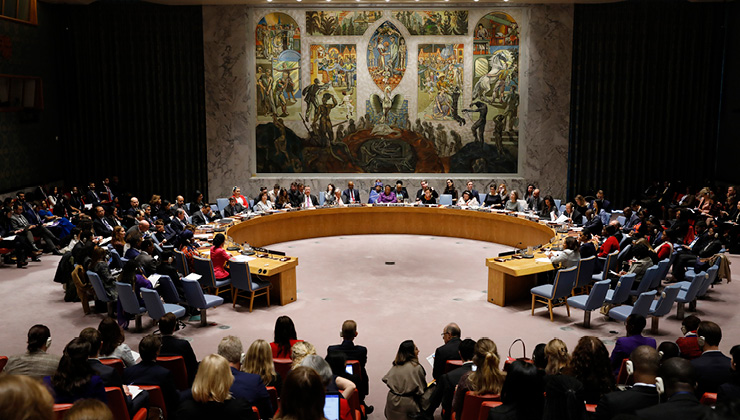Christine Chinkin provides an initial response* to the UK Government’s fourth National Action Plan (NAP) on women, peace and security.
I welcome the adoption of the UK’s fourth National Action Plan on Women, Peace and Security – its blueprint for implementation of the WPS agenda until 2022. It is an extensive and strategic document that reflects the ambition of the Security Council’s WPS agenda across its four pillars – women’s equal participation, prevention of conflict and all forms of violence against women and girls, protection and promotion of women’s rights in conflict and relief and recovery.
There is a great deal I could say and I am sure that as I study it in greater detail there will be even more but just two points:
The first relates to process. The LSE Centre for Women, Peace and Security especially welcomed the involvement of the academic sector as well as the NGO sector from early on in the process, giving us the opportunity to contribute our own comments and recommendations as well as to coordinate those made by academics from across the country based upon reactions to the previous NAP. 16 academics made submissions with a range of thoughtful ideas. We also welcomed the invitation to join a discussion session and to respond to an earlier draft of the NAP. Inevitably the drafters did not agree with all our suggestions as to the proposed content and scope of the NAP and by no means were all the recommendations accepted in the final draft. But the process demonstrated the depth of interest in and diversity of views about WPS across academic institutions and disciplines and perhaps indicates the emergence of WPS as separate field of academic study that can continue to inform and – I hope – enrich policy.
Second and more substantively – I especially welcome that the first words of the NAP are to reaffirm that WPS exists to promote and fulfil women’s human rights and to achieve gender equality. Elsewhere the NAP supports the UK’s efforts to deliver on other international commitments including the Sustainable Development Goals – especially Goal 5.2 – eliminate all forms of violence against women in public and private life – and the recently adopted CEDAW GR 35 on violence against women. As well as the integration of WPS with other international agendas, the NAP emphasises the importance of evidence, of context and of local knowledge, involving women from conflict-affected areas in the design and implementation of relevant programmes in accordance with international standards and of coordination between multiple sectors and at all levels of intervention – all directed towards a holistic approach.
In celebrating the launch of the NAP, we cannot forget why it is needed – the incidence of continuing conflict and of violence against women and girls – not just those that are widely reported and thus visible such as against Rohingya or Yazidi women, but also the normal, everyday and less remarked upon incidence of rape, sexual violence, poverty, displacement and inequalities. The NAP makes clear how much has been achieved since the adoption of resolution 1325 but also how much more must be done. The NAP asserts the commitment of the Government to gender analysis in conflict analysis, and to raising awareness of WPS in engagement across government and with external partners. In light of shifts in the global political landscape such commitment is essential both to protect the advances made in WPS policy and to resist any attempts at undermining the values and objectives of the agenda and its transformative potential. It shows the scope for further collaborative efforts and the Centre for Women, Peace and Security at LSE will continue its work in advancing those values through education, research and in working across all sectors and with all government departments – in seeking to make this NAP a reality on the ground.
*Text of remarks made at the launch of the UK’s 4th National Action Plan on Women, Peace and Security, 16 January 2018, Foreign and Commonwealth Office, London, UK
Read more:
Recommendations for the UK national action plan on women, peace and security (May 2017) Centre for Women, Peace and Security, LSE.
UK national action plan on women, peace and security 2018 to 2022 (January 2018) Department for International Development, Foreign & Commonwealth Office, Ministry of Defence, and Stabilisation Unit.
The views, thoughts and opinions expressed in this blog post are those of the author(s) only, and do not reflect LSE’s or those of the LSE Centre for Women, Peace and Security.





